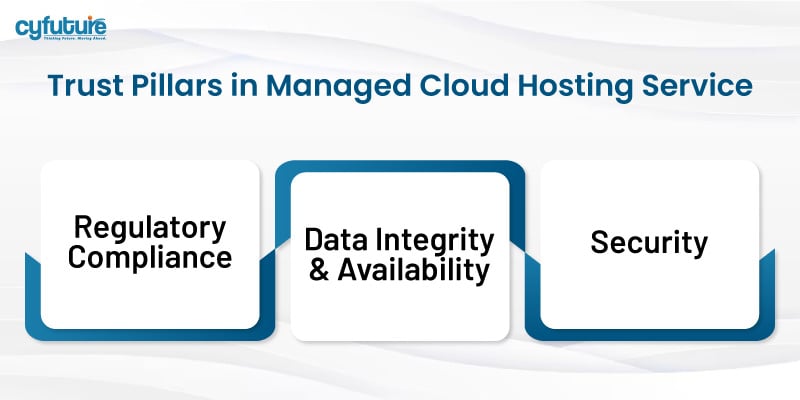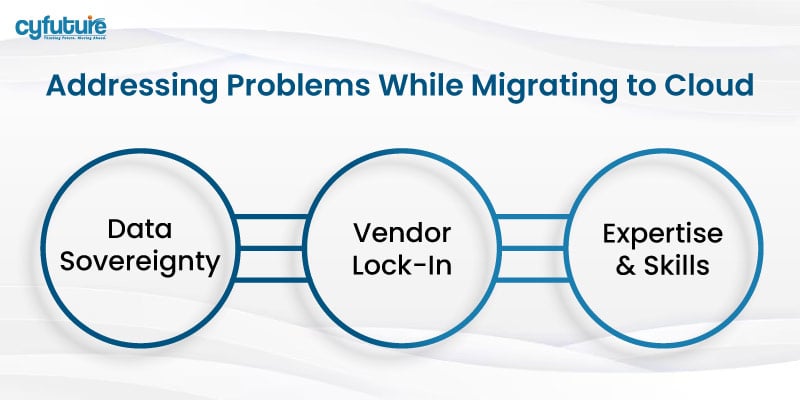-
Get Cloud GPU Server - Register Now!
Toggle navigation

As the fight for digital transformation in finance unfolds, trust is the cornerstone of all operations, which naturally raises the question of how it may be preserved in a more virtual environment. In essence, banks’ trust in their most valuable asset—data—is threatened as it moves to cloud storage. As a result, the only way to overcome this problem is by innovation motivated by an unwavering demand for security and peace of mind. Technology isn’t the only factor anymore.
Financial institutions may now attain never-before-seen levels of cost-effectiveness, scalability, and agility. This is because of the shift to cloud computing, notably managed cloud hosting services. On the flip side, during the active and inactive stages, data integrity needs to be preserved. Businesses may successfully navigate the challenging landscape of cloud computing adoption while preserving the privacy and confidence of their clientele by better understanding the relationship between financial operations and server hosting in a particular cloud operator.
In this comprehensive blog post, we will look at how Managed Cloud Hosting Services, rather than just being a technological improvement, represent a conscious effort to strengthen security and trust in the banking industry. However, we’ll look at the architecture of cloud hosting, understand the security and trust frameworks that support and legitimize this shift, and analyze how cloud hosting works in financial institutions.
Managed cloud hosting is a service paradigm in which an external provider manages the servers, storage, networks, and applications that make up an organization’s cloud infrastructure. By adopting this service, financial institutions may delegate the task of managing their IT infrastructure to someone else and concentrate on their core business operations.

Faith in the financial sector is not simple to come by. Its cornerstones include strict legal requirements, robust security procedures, and an unwavering commitment to data security. When a financial institution entrusts its data and operations to a managed cloud hosting provider, the provider must make sure that these pillars of confidence are not just upheld but fostered.
Financial activities must abide by a complex web of regulations intended to safeguard customers, promote market stability, and maintain the integrity of financial systems. These strict criteria, which are more than just recommendations, must be followed by establishments. Any infraction or noncompliance might have dire repercussions, including a reduction in customer confidence and irreversible damage to the institution’s image.
To meet these regulatory obligations, managed cloud hosting services for the financial industry must be ready. To certify conformance with these standards, one must possess the necessary certifications and audit skills in addition to having a thorough awareness of the particular compliance criteria set out by each jurisdiction. Gaining the trust of financial institutions is more advantageous for providers that can exhibit adherence to regulations like GDPR, PCI-DSS, and SOC 2.
Furthermore, teams dedicated to making sure that their services comply with evolving criteria are usually present in managed cloud hosting firms. Providing a level of protection that conventional on-premise systems might not be able to match, this proactive approach helps financial organizations keep ahead of regulatory changes and avoid compliance pitfalls.
The financial industry requires data to survive. It runs processing transactions, managing investments and client data on the availability as well as quality of data. If the availability or integrity of the information is compromised in some way, there can be far-reaching effects like monetary losses, operational challenges, and damage to an institution’s reputation.
Managed cloud hosting services have redundancy and disaster recovery as their core operational philosophies. These services ensure that even in case there is a local failure, financial institutions can continue accessing their data without any interruptions since they utilize multiple data centers located across various geographical locations. Moreover, such geographical diversity serves as an additional line of defense against natural disasters or any other region-specific risks.
By providing robust data backup and recovery features, managed cloud hosting services also guarantee that financial institutions can restore operations quickly after any loss of information. This kind of resilience is important to maintain trust within an environment where every disruption or loss may result in damaging consequences.
Financial data will inevitably be protected. Financial organizations are often targeted by cyber attackers due to the sensitive data they handle. As a result, managed cloud hosting services need to build an environment akin to a castle that can resist even the most advanced attacks.
The security of managed cloud hosting is multi-layered and includes contemporary encryption methods, network security standards, and physical security measures. The data is encrypted whether it is being stored or in transit to make sure that it becomes impossible to read without the right decryption key if intercepted.
In addition to that, continuous monitoring as well as threat detection systems that use machine learning or artificial intelligence are also adopted by most managed cloud hosting providers such as banks to identify and respond to potential threats in real-time. This proactive security measure prevents data breaches from occurring in the first place, thus giving financial institutions assurance about the safety of their information amidst rapidly changing attack sources.
The usage of two-step verification (MFA) together with role-based access control (RBAC) serves to ensure that only authorized personnel can access sensitive data, and this reduces insider threat risks. Such security measures, including regular checks and reviews on how safe a bank’s environment is, make it easier for financial organizations to feel secure there.
While trust and security are paramount, managed cloud hosting provides other benefits that go beyond these two key aspects. By utilizing managed cloud hosting services, financial service providers will enjoy various significant strategic benefits aimed at promoting innovation in their organizations while enhancing efficiencies and providing a better customer experience
The financial sector is as dynamic as it gets, where institutions continuously modify their systems according to ever-changing market conditions customer expectations, and regulations. Managed cloud hosting services offer the scalability and flexibility required for responding to these changes immediately and efficiently.
In managed cloud hosting environments, financial institutions can change the size of their IT resources based on demand, thereby ensuring they can handle peak loads without overinvesting in infrastructure. This kind of flexibility is especially important during times of rapid growth, mergers, or acquisitions, where the ability to quickly integrate and scale operations can make or break a company.
In addition, managed cloud hosting services also enable financial organizations to launch new applications and services much faster, thereby keeping them ahead of competitors as well as remaining proactive on emerging trends. This agility gives rise to a competitive edge in an industry characterized by a fast pace of innovation, where speed is everything when it comes to new ideas.
Significant capital is needed for hardware, software, and maintenance within traditional on-premise infrastructure. However, managed cloud hosting services work on a subscription basis, making financial institutions transform these capital expenditures into operational expenses.
Such a shift in the cost structure can help financial institutions as they gain more flexibility in terms of finances and thus be able to allocate their resources to other strategic initiatives. Moreover, managed cloud hosting services often offer ongoing maintenance, updates, and support as part of their services, thus relieving internal IT teams of some burdens, hence also reducing costs.
Managed cloud hosting’s cost efficiency goes beyond just cutting down costs; it is about optimizing investments for maximum returns. By tapping into the expertise and infrastructure of cloud hosting providers, financial institutions can concentrate on their primary business activities that stimulate growth and innovation, while keeping an IT environment that is safe and dependable at all times.
In this interconnected world, the driver of innovation and quality is collaboration. Hence, managed cloud hosting services enable financial institutions to use tools and platforms that enhance internal and external organizational partnerships.
Cloud-based collaboration platforms allow teams to interact as they are in the same geographical location with their topography; hence, organizations become more responsive and flexible. This type of enhanced collaboration results in more creative ideas, faster production cycles, and improved customer experience among others.
Additionally, managed cloud hosting services usually offer access to state-of-the-art technologies such as artificial intelligence (AI), machine learning (ML), or big data analytics (BDA) for instance. Such technologies enable financial institutions to comprehend their operations, clients, and markets better which henceforth leads them toward making sound decisions based upon facts thus promoting ongoing adjustments.
Effective co-creation capabilities as well as innovation skills set them apart from others however in today’s world; it has become an absolute necessity especially if one is part of a rapidly transforming financial environment. The basis of superior culture revolves around managed cloud hosting services; via this, financial institutions can take precautionary steps against competition and thus provide their clients with value.

Despite being obvious that managed cloud hosting has its many advantages; still for financial institutions to fully adopt it, there are some challenges that they must overcome together with their fears about it. Among other challenges, these include understanding data sovereignty, and vendor lock-in as well as having specialized personnel who will efficiently manage and protect cloud environments.
This means that your data will be governed by the rules and laws of wherever you put it. Data locality for banks that operate across several countries is an intricate and tough thing to do something about.
Provision should be made employing managed hosting in the clouds whose services are in line with every jurisdiction’s law on data sovereignty so that they can hold and manipulate information according to their country’s laws Financial organizations need them. Unfortunately, sometimes this involves setting storage locations at certain places or states.
Financial institutions must closely assess the data sovereignty capacities of their cloud hosting service providers to guarantee compliance with global laws and also avoid possible legal and operational challenges.
Vendor lock-in is a situation where financial institutions rely on a single cloud hosting provider, making it hard to change providers or transfer data elsewhere. This might limit flexibility as well as control, which might result in higher expenses and lost opportunities.
To reduce the risk of vendor lock-in, financial institutions should opt for managed cloud hosting providers that use open standards, interoperability, and data portability. This makes it possible for institutions to move their data and applications from one cloud platform to another when needed, thus enabling them to adjust themselves by shifting business requirements without getting tied down by one provider.
Moreover, financial institutions should go ahead with contracts that contain exit strategies together with unambiguous terms regarding the movement of data or termination of services. It will help them have the liberty of changing providers if localization is necessary, but not at great costs or interruptions to their operations.
The specialized knowledge and abilities required for the successful adoption of managed cloud hosting may not be readily accessible in the IT department of financial institutions. Cloud architecture, security best practices, and regulatory compliance are part of what is included.
To tackle this challenge, financial institutions can invest in training as well as development programs that create a pool of professionals who are ready for cloud computing career opportunities. This includes providing IT personnel with the qualifications and competencies needed to manage or protect a cloud system efficiently.
Alternatively, financial entities could work closely with companies offering cloud-hosting services on demand to take advantage of their expertise and resources. These institutions would thus overcome skills shortages while ensuring high standards in terms of management and security for their cloud-based solutions.
As digitization cleaves through banks or any financial institution reputable worldwide recently, then what will happen next? All these digital transformations are made possible by managed hosting service providers, who will always find themselves playing a central role in their lives. Organizations need to stay relevant amidst rapid changes by having scalable applications that promote innovation within secured boundaries that still observe laws.
On the other hand, creating more advanced cloud systems will involve more use of artificial intelligence (AI), machine learning (ML), and blockchain technology within the managed cloud hosting services. In addition to securing networks and enhancing service delivery performance levels, they can also gain insights into complex financial functions.
So managing a cloud means meeting the highest possible security requirements and compliance obligations due to shifting regulations. For this reason, constant investment into data centers, people resources, and creativity has to remain a priority so that banking institutions trust them with the reliability and security that they deserve.
In today’s world of digitized finances, confidence in dealings is paramount. The cornerstones of successful financial transactions are trust and security. One such managed cloud hosting service gives banks a structure around which they can rely on when it comes to new technologies that will help them deal with complexities well.
Financial institutions should start by knowing exactly what kind of things are important when it comes to having confidence if they want to go for managed-cloud hosting businesses—these are things like regulatory compliance, data integrity, and security. In addition, using some advantages associated with Managed Cloud Hosting such as scalability, cost savings, and improved communication may help them stand out from competitors over time.
As finance companies modernize themselves and adopt new ways of doing business through incorporating newer forms of technology into their operations system like managed cloud hosting; these institutions would continue to maintain customer confidence because they would be able to operate within secure environments.